Our Research Notes series invites authors to describe their process for a recent book, with “research” defined as broadly as they like. This week, Valerie Werder writes about Thieves from Fence.
+
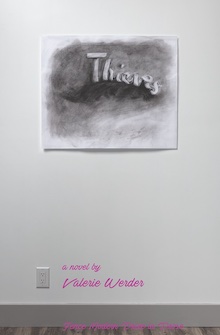
December 22, 2016 — I receive a hardcover journal from a coworker at a holiday party Secret Santa. She’s the exhibitions coordinator; I’m the “voice of the gallery,” the young woman paid to anonymously type sales pitches and press releases, to ghostwrite essays and give interviews in the gallery owner’s name. Earlier that day, I’d been working on a research note meant to entice the CEO of Walmart to buy a fifty-million-dollar Frank Stella painting. Arbeit Macht Frei, the painting’s title informs me. Work will set you free. My boss asks me to downplay that Stella grafted the phrase from the Nazi slogan at the entrance to Auschwitz. Too pessimistic, she says. Despite the December slush, Alice Walton arrives at the gallery wearing Walmart-brand madras capris.
I do not note whether or not Walton bought the Stella in this first journal entry. As a lackey to the sales staff, a language-producing girl-machine, I am not privy to financial particulars. I do know, though, that the employee who gifted me the journal received a $50,000 year-end bonus for organizing an especially successful exhibition of Calder miniatures. The gallery owner had originally asked me to organize the show, but another sales director commandeered me away, citing her need for me, her love for me. My journal’s margins are dotted with basic arithmetic: $50,000, I calculate, is approximately two-thirds the amount of the student loan I took out to attend a graduate program where I’d spent hours reading Artforum and e-flux, trying to become proficient enough in International Art English to join in on class discussions. It’s fourteen months and three days of my life measured in wages paid to me by the gallery to produce, now fluently, a continuous stream of artspeak. It’s half of a shitty and damaged drawing by Carl Andre or one and a quarter of one of Adrian Piper’s most important early photographs. My coworker didn’t tell me about the bonus herself, of course: a congratulatory email addressed to her had come through while I was sitting at her desk long after she’d left for the evening, drafting emails in her voice, urging collectors to buy.
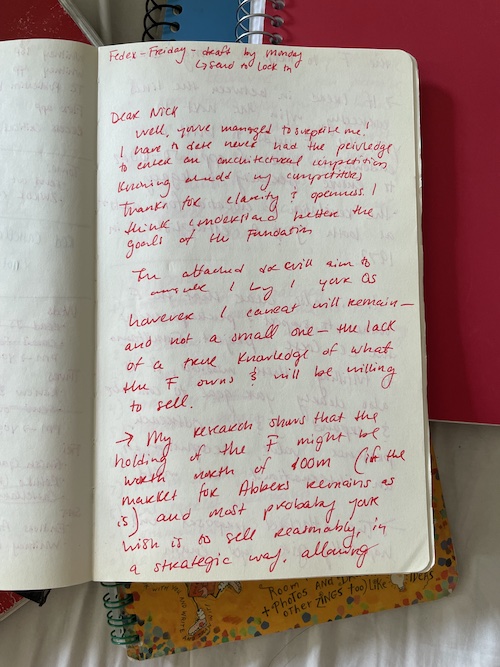
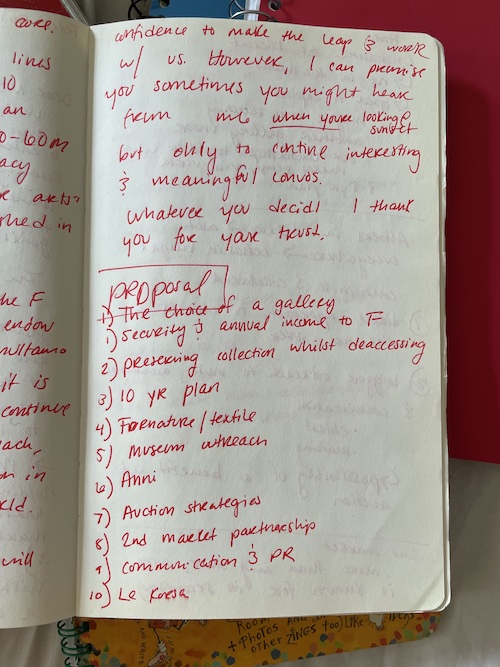
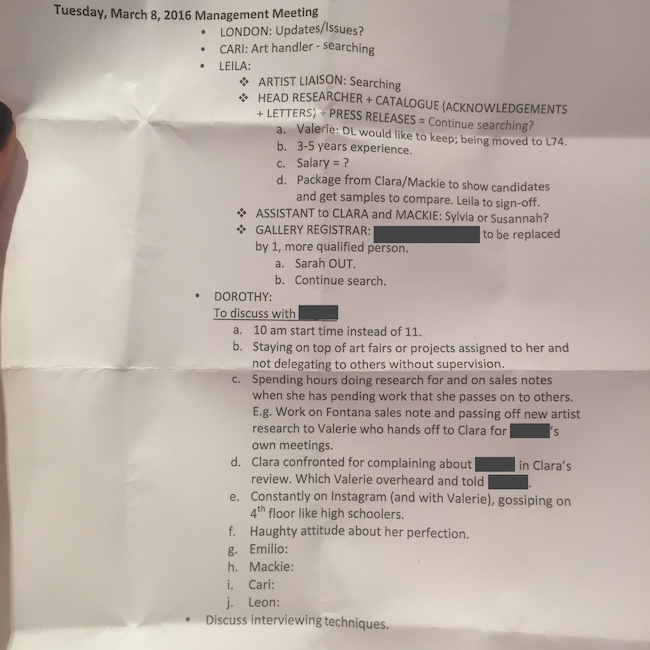
+
January 4, 2017 — I spend hours stealing time away from my boss, sitting at my desk and reshaping spam emails and notices from HR into fictional fragments, transforming old press releases into rambling discourses on self-flagellation as a form of entertainment, on the moralism of exercise culture, on the lives and longings of the ghostwriters and secretaries who typed and edited the hardcover books that line the office walls and from which I, the gallery’s voice, liberally plagiarize. I am bored at work. I am wasting time. I share one of my fictional fragments with the man I’m seeing. He tells me I should write a book, and when I tell him that I don’t have the time, that I work constantly, he begins to rattle off the daily routines of Ken Kesey and Charles Bukowski as if they were templates anyone could slot themselves into.
My sibling and I played weekslong epic games when we were young, inventing new roles and winding narratives that took over our lives completely. At a certain age, make believe became lying, but I still admire the sorts of grifters and artists who believe so desperately in realities of their own design that they eventually will them into being, or will themselves into denial. I’d been so busy being a full-time gallery girl that I hadn’t thought to simply pick myself up and situate myself elsewhere.
I spend the next workday Googling writers I admire and consulting their biographies, computer screen in full view, no longer afraid of my boss. Her second novel was made possible by residencies at … they were the 2013 writer in residence in … she has received residences from. Two days later, I tell the gallery owner I’ve received a prestigious three-month residency but do not provide further details. She allows me an unpaid sabbatical. Worrying about my capacity to afford health insurance (and, bizarrely—though I’d by then grown accustomed to the bizarre worries of the rich—to do laundry), offers that I can continue to write for the gallery remotely at a per-word rate. A friend of a friend has a cabin in Tennessee that I can rent for $300 a month; another friend loans me her car. My residency, like the idea for my book, like the value of a Frank Stella painting or the cost of a single written word, is contrived from thin air.

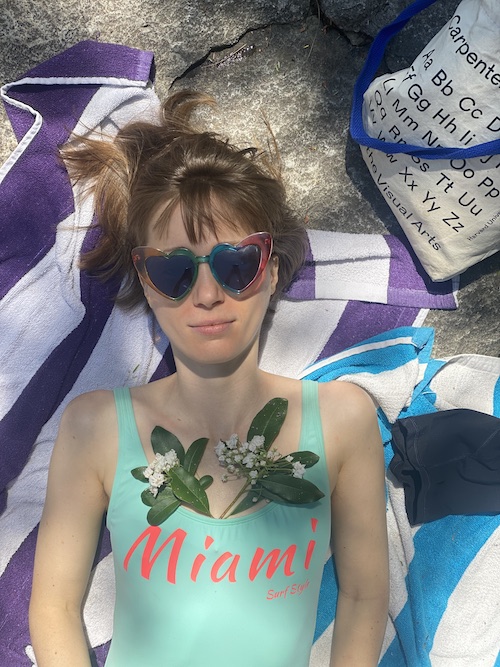
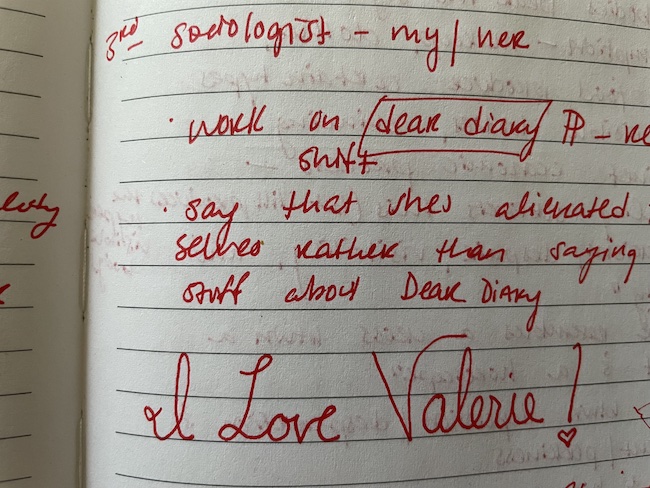
+
January 20, 2017 — The man who believes in Kesey and Bukowski’s routines flies to Nashville to visit me. I pick him up at the airport; we drive to a Mexican restaurant to discuss my in-progress manuscript. I tell him I’m examining my life as a generic form, myself as a commodity. I’m reading my childhood journals and transcribing my dreams and adding everything up as I would an artwork’s provenance, its critical reception, its condition, trying to figure out how I’d come together just so. I ask his opinion on the book’s first chapters to make him feel valued. When the check comes, I hand over my card to cover our margaritas and guacamole; he uses the restaurant’s pen to scrawl I love Valerie in my journal. He does not have a job. He worries about money but claims he cannot write and work at the same time. My friends who are writers and poets and students in New York all hold menial jobs as bartenders, nannies, cashiers, receptionists, I think but do not say. He tells me he will work on a screenplay while he stays with me at the cabin; he lays out pens and scatters notebooks but does not write. I pay rent and buy necessaries; he shoplifts expensive cheeses and sweets.
During this time, I often think of the cheap metal hangers at the laundromat where I took my boss’s Celine suits for dry cleaning. We love our customers, they proclaimed. The man and I decide to spend the final weeks of my sabbatical in Miami. The gallery pays me to write a 1,500-word press release; I Venmo $1,500 to a stranger for a South Beach sublet. She presses the heart icon below the transfer to make it glow red. My boss often told me she loved me. I love my work, I write on February 12th, though I’m not sure now whether I meant to refer to my in-progress manuscript or my work for the gallery. On April 26th, I write, what is love besides the disavowal of transaction?
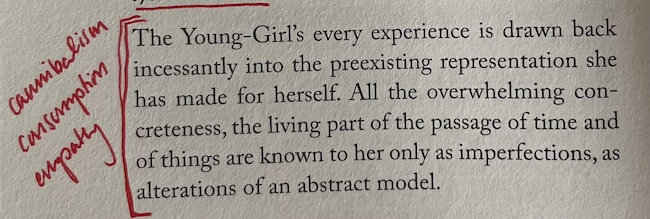
+
April 1, 2018 — Having worked for the past four years as an art writer New York, I type, I’ve composed many personal histories, none my own: curatorial career narratives, blue-chip artist biographies, and dozens of chronologies for women or non-Western artists whose markets a gallery was trying to ‘invigorate.’ I’ve learned that, to make a life legible, one must first invent a thread and then follow it. Fragments, when arranged chronologically, begin to cohere into a causal narrative. One’s little life, once written, can be mapped onto and into broader generalities: for me, for Valerie, the voice of the gallery, the story of contemporary art. My manuscript is complete; it is both an autofictional narrative and a generic account of a gallery girl’s efforts and humiliations. I use fiction writing and performance to address questions of language, legibility, and power, staging theoretical interventions in real time and space rather than engaging the age-old opposition between theory and practice, I write in cover letters to publishers, graduate school applications, emails to potential employers. I want to leave the gallery. Because of my time working as its voice, I know how to use language to fashion objects both fleshy and plastic into legitimate cultural entities, into artists and artworks. This training led me to research the fashioning of myself, which led me to write Thieves, the publication of which, I think, might eventually authorize my own name as a place from which to speak. I feel ambivalent about this, even as I proofread my thrilled and enthusiastic submissions, even as I press send.

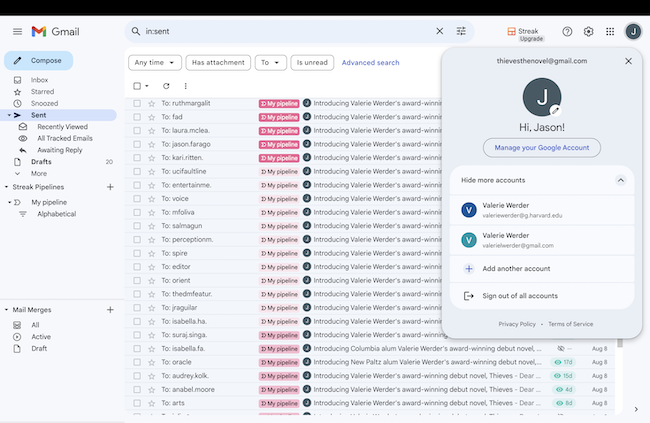
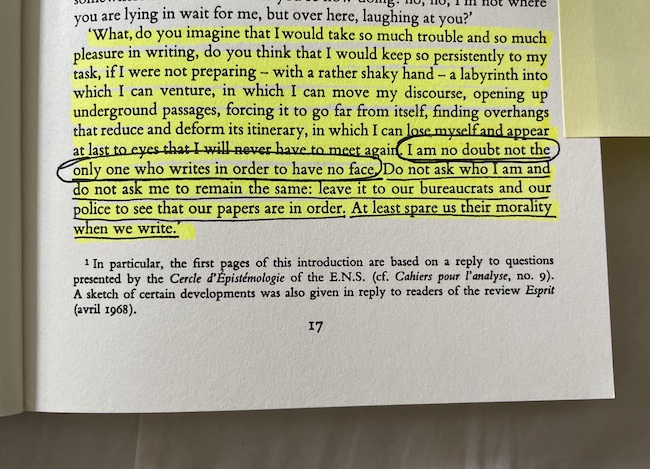
+
July 29, 2023 — I am again composing emails to be sent from another person’s name. All my best, Jason, I write, scheduling hundreds of messages to magazine editors and freelance journalists and podcasters. This time, though, I’m not selling a painting by Frank Stella or promoting an exhibition of Calder miniatures: I’m advertising myself, trying to drum up interest in Valerie Werder’s award-winning debut novel, Thieves. Before, I couldn’t write from my own name because my name meant nothing, was not a sufficient vehicle for authoritative speech. Now, though, I can’t write from my own name because I am the commodity. Having written myself into being as “Valerie,” I have also dispossessed myself of a position from which to speak without the burden of wearing my own face, my own name. “Valerie” is no longer an anonymous entity swimming in a sea of language. For readers of … I, or Jason, types, and I line the names of those whose biographies I once consulted in a neat row in the email’s final paragraph, using them to authorize myself once again.
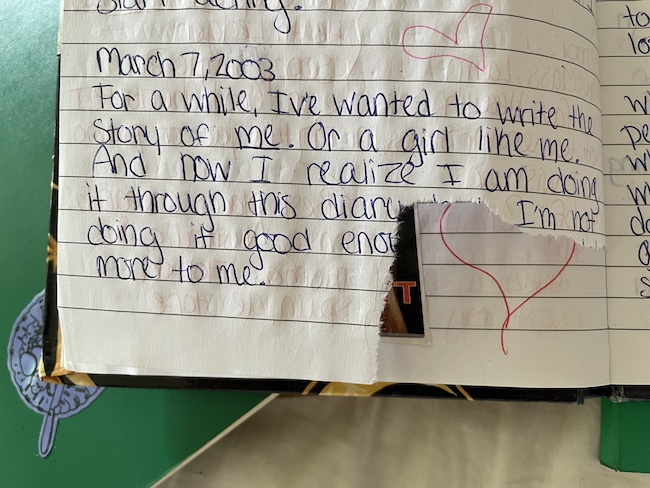

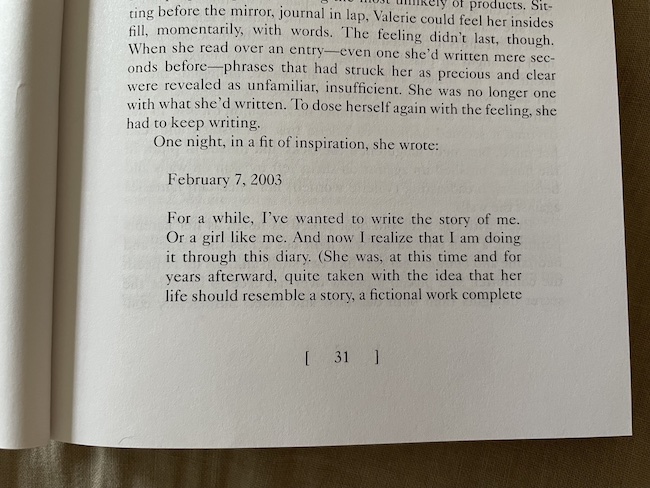
+
August 24, 2023 — Fiction is not reality. It is an autonomous representation of reality in which correspondences have been tightened and details altered so as to make reality’s strangeness more available. This note is an accumulation of fragments detailing the research and writing of Thieves, but the boundaries between living Valerie, researching her, and writing her do not exist: they are themselves fictions.
+++
Valerie Werder is a fiction writer, recovering art worker, and doctoral candidate in film and visual studies at Harvard University. Her writing has been published in Public Culture, BOMB, and Flash Art, and performed at Participant Inc, New York, and Artspace New Haven. Werder is a 2023-23 PEN America Prison and Justice Writing Program Mentor. She lives in Somerville, Massachusetts with a black cat and hundreds of books.